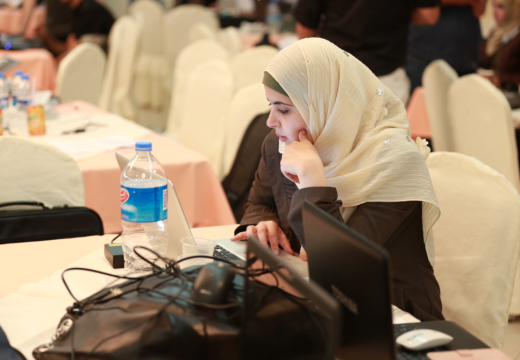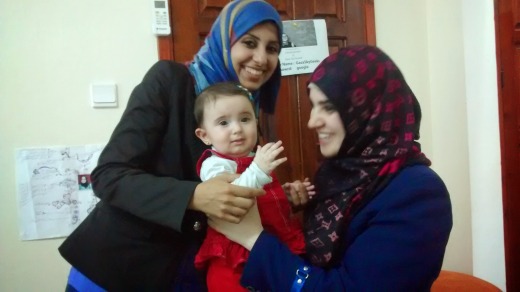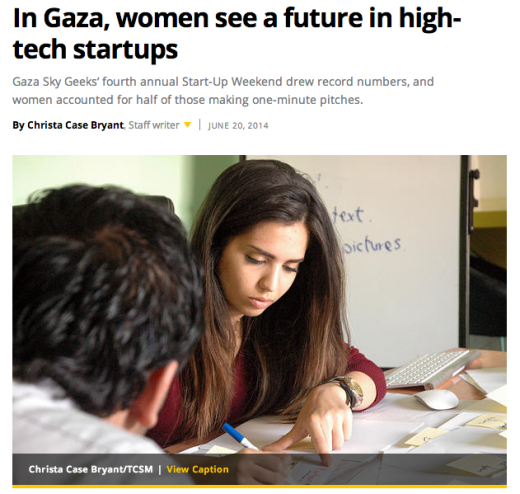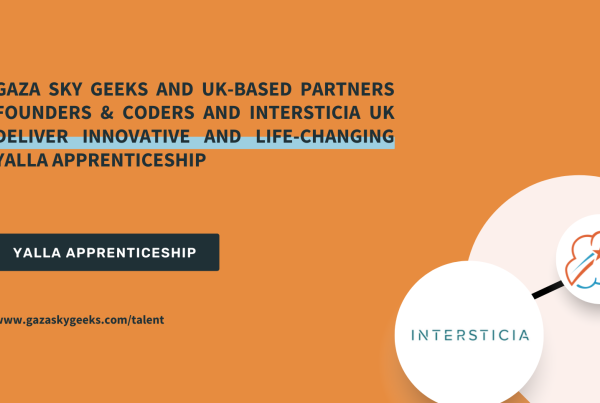We’ve seen a high percentage of women’s participation in the startup sector in Gaza since we began our work: often, 30% of the attendees at our events are women. But when we first presented our startups to investors in November 2013, only male-led teams received investment. It’s too early to determine whether this is a trend or not. We have a sense that it is — and we want to nip it in the bud.
A world of opportunity
It’s easy to look at a place like Gaza and pity those of us who work there. In fact, it’s also a place full of opportunity. Women’s leadership in the tech entrepreneurship sector is one of those. Here’s why:
In some parts of the world, it’s normal to see 15% women’s participation at an event like Startup Weekend. In Gaza, those percentages have already been around 30%. We could settle for that level of participation — it’s already quite high, right? We don’t think so. Rather, we believe that places like Gaza can lead the way in forming an inclusive startup community.
2. It’s closed off from the rest of the world
It’s awful that Gaza’s borders separate our entrepreneurs from the startup movement around the world. (In other posts, we’ll describe the negative impact of those closed borders.) But in the case of women’s leadership, it may be a positive: the people we work with haven’t been exposed to the low level of women’s leadership elsewhere. Here, we can harness the closed space to incubate a startup sector whose faces reflect the diversity in the broader environment.
3. Women know they are good at math and science (STEM fields)
Before moving to Gaza, I lived in Jordan and had a Syrian roommate. She had never heard of the stereotype that women are worse at science, technology, engineering, and math (STEM fields) than men. The same applies to Gazans. Girls generally get the best scores in these fields in high school. “Americans think women are worse at math and science than men?” a Gazan young woman once asked me. “That’s ridiculous. We’re better.”
4. Families are eager for anyone to bring in income
At Yahoo’s “Change the World” conference in Amman in 2014, I learned that some Jordanian communities do not feel comfortable having their daughters work in environments with men. That may apply to some extent to Gazan families, but overall, because unemployment is 50%, any family member who can bring in income is encouraged to do so. Plus, with high percentage of women at Startup Weekends and the Gaza Sky Geeks co-working space, families know that their daughters will be in a safe place.
A world of challenges

Of course, that doesn’t mean there are no challenges. When my team at Gaza Sky Geeks decided to set a goal to increase the number of women-led teams securing investment (or launching their startups successfully without them), we ran focus groups to find out what barriers women were facing. Here’s what we found:
Whether it’s the husband or the father, families’ opinions matter more when women are making choices than when men are making choices. That matters because…
2. Startups hold no prestige in Gaza
Most Gazans have never heard of a startup. Families would prefer that their daughters, sisters, and wives do something prestigious — or at least understood. I’m still no expert on Gaza, but from what I’ve learned during my time here, it is prestigious to earn income, get a degree, or receive a certificate/prize (at the end of a training course or competition). Why someone would want to head off to a co-working space every day without bringing home any immediate income (nor a certificate!) is simply confounding.
Families also hesitate to encourage their daughters’ involvement in entrepreneurship because resources are scarce. It costs some people a monthly salary ($400) to transport themselves to our co-working space and back home each day. Why spend the family’s money on something that isn’t yielding a clear return?
4. Women have lower confidence than men
In our focus groups, women said over and over again that they didn’t think they had the skills or knowledge necessary to launch a startup. We knew that their skill set was similar to that of men in the pipeline. Women said they would eagerly engage in a structured program (training, coaching, milestones, etc.) but outside of that context, they did not know how to move forward.
That’s how we decided to launch our solution: Intalqi (“Let’s begin!” in Arabic).
Intalqi: Creating women startup founders in Gaza

Our initial design was simple. To address families’ lack of support for entrepreneurship, we:
We gave women participants small stipends ($100/month for women leaders in the program, small prizes for other women) so that their families could see an immediate, tangible benefit. Women said their families loved this — even if it was not much, it made them believe that their daughters were valued.
We also sent families a text message each week describing their daughters’ or wives’ accomplishments. We asked the women which family member should receive those messages. Then we sent them: “Lina just gave one of the best presentations we’ve ever seen!” we wrote, or “Tala’s idea has evolved into one with tremendous potential!” Women said their fathers and husbands loved this, too.
Finally, we planned to give certificates and invite families to see the final women’s final pitches. We ended up stretched thin preparing to launch Startup Weekend, and soon after that the Israeli-Gaza 2014 conflict broke out, so we failed to implement this piece. We still believe it would be worthwhile in our next round.
2. Build an alternate community to support women founders
We want to get families on board with their daughters’ or wives’ dreams, but we realize families are unlikely to provide serious support until launching a startup in Gaza becomes as prestigious as launching one in Silicon Valley. In the meantime, launching a startup anywhere is hard and founders are much more likely to be successful if they have a community that supports them.
We decided to create one. Intalqi was composed of 10 “Big Sisters” (women who had already started working on a startup) and 10 “Little Sisters” (women who showed potential but had no experience). The Big Sisters felt responsible for the Little Sisters’ success, which put useful community pressure on them to continue with their endeavors. Everyone participated in bi-weekly discussions and training, and soon, the Big Sisters and Little Sisters were bringing new friends to our space.
Gaza’s tech sector is still nascent, and the biggest challenge our founders face is their lack of connection to other countries. That translates to lack of awareness of trends, lack of mentors, difficult access to new markets, etc. Thus, a core part of Intalqi were our outside mentors: each Big Sister was paired with a mentor from abroad.
3. Make it clear that women are welcome
For our Startup Weekend in June 2014, we consciously targeted women. We designed a logo and color scheme intended to make it clear that women are welcome. Since then, we’ve learned from Google’s other #40Forward partners — especially UPGlobal, the company that created Startup Weekend—that simply inviting women to events can increase women’s participation immediately. We’ve become big advocates of being thoughtful about the pictures we put on our website, the way we decorate our space, and other symbols that communicate unconscious or conscious messages.
It’s also ok to weight participation towards women, at the beginning of such a movement, to build an environment that is clearly comfortable for women. For our June 2014 Startup Weekend, 30% of the applications we received were from women and 70% from men, but we accepted 50% of each. We worried how this would impact the quality of the event. As you’ll see below, those fears were unnecessary.
4. Give women more (and higher quality) training
Because women said they’d continue working on their startups if they could participate in a structured program, we built one. The entrepreneurship training that exists in Gaza is sorely out of date, so rather than replicating it, we created our own. We were the first to bring the Lean Startup methodology to Gaza, the concept of embracing failure, and more. Mostly, we focused on identifying a market, iterating to create an idea that had large potential, and finding a team to launch a prototype of the idea. (To learn more about our reasons for developing this curriculum, see Sofiya’s story.)
The result of our work was a dramatic increase in women’s leadership in the startup sector in Gaza. We ran Intalqi for just 2 months before Startup Weekend. Over 600 people applied to the event. We chose 150 participants. On the first day, 70 pitched ideas. Half of those were women. The idea that won the most votes was by Nalan al-Sarraj, a Little Sister from Intalqi.
At the end of the event, 2 of the top 3 teams were ones with women leaders. We’ve now reopened the co-working space for the first time since Startup Weekend (we had a two-month lag due to the war in in July & August), and so far, approximately 70% of the people at the space each day are women. Out of the 5 most prominent startups in our pipeline, 4 are led by women or have women co-founders.
We’re proud — and eager to keep pushing the envelope in this work.


 
by staff writer
Iliana Montauk
Gaza Sky Geeks Director, Mercy Corps Digital Economy Program Director



